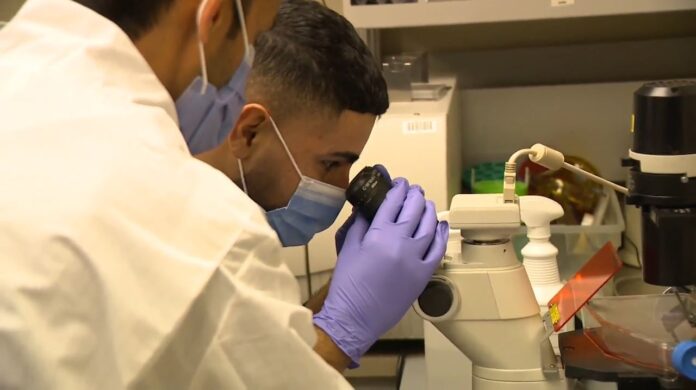Researchers at BC Children’s Hospital have diagnosed a young man with a genetic condition that nobody else in the world has.
Ebrahim Aldalati is the first person in the world to be diagnosed with a specific gene mutation condition.
The 23-year-old from Syria has an unknown mutation to a gene that controls the production of a protein key to determining how immune cells function.
Read more:
Long wait times at hospitals, shortage of medication causing stress for B.C. parents, doctors
The gene and protein have been studied for two decades in mice, but Aldalati is the first person in the world to be diagnosed as being totally deficient in NFAT1.
“People are doing this work because we realize we can now make these life-changing diagnoses,” said Dr. Stuart Turvey with the BC Children’s Hospital Research Institute.
“We are very good at it here at BC Children’s Hospital and we have been able to lead the world with this example.”
As a boy, Aldalati had a lot of trouble moving his knees, ankles, elbows and hips.
He would also get sick with a lot of fevers and colds and developed a rare form of cancer.
No one could figure out what was going wrong and at the age of 15, Aldalati and his family arrived in Canada and into the care of BC Children’s Hospital.
BC Children’s Hospital’s Rare Disease Discovery Hub, led by Turvey, began to look at Aldalati’s case, wondering if there was a single cause.
Blood and tissue samples allowed researchers to study his cells directly and Dr. Mehul Sharma discovered the startling truth.
“This work is ground-breaking,” Sharma said. “It gives him an answer as to what has caused all his problems.”
While doctors know what’s wrong with Aldalati, there is no cure and no treatment, but the team now knows where to look in the future for other patients.
Aldalati knows it could be years more before he gets treatment, if at all, but he takes comfort in knowing the next patient won’t have to wait 20 years to get the answers they will need.
“I can do everything so that’s good,” said Aldalati. “I like to help other people. Maybe this will help other people a lot.”
4:37
Health Matters: Teen patient tells his story of treatment and support at BC Children’s Hospital
© 2022 Global News, a division of Corus Entertainment Inc.



